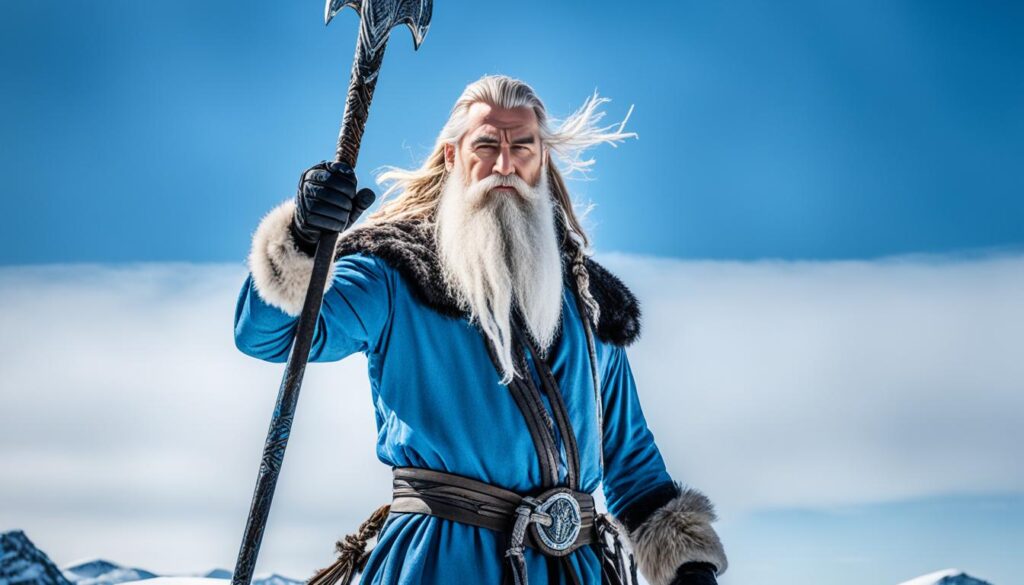Aesir Gods, Ginnungagap, Norse Gods, Norse Mythology, Tales of the Gods, The Nine Worlds
What Is Buri The God Of?
Buri, a prominent figure in Norse mythology, holds a significant place among the pantheon of gods. As the progenitor deity, Buri played a crucial role in the creation of the Nine Realms and the birth of the gods. His powers and abilities encompassed various aspects of the natural world, making him a revered and influential figure.
Join us as we embark on a mythical journey through the realms of Norse mythology, exploring Buri’s origins, powers, symbolism, and legacy. We will also examine his relationships and connections with other prominent gods and reflect on Buri’s enduring significance in shaping the past, present, and future of Norse mythology.
Norse Mythology and Buri
In Norse mythology, Buri holds a significant place within the pantheon of gods. As the progenitor deity, Buri is revered as the ancestor of the gods, playing a crucial role in the creation and shaping of the Nine Realms. But who is Buri in Norse mythology? Let’s delve deeper into his story.
In Norse mythology, Buri is known for his relationships, including his wife. The identity of Norse mythology Buri`s wife varies across different sources and interpretations. Some texts mention Bestla as his wife, while others associate him with a giantess named Bolthorn or a cow named Audhumla. These diverse interpretations highlight the complexities and variations within Norse mythology.
Throughout Norse mythology, Buri’s lineage and connections play a significant role in shaping the narrative. His descendants, such as his son Bor and grandsons Odin, Vili, and Ve, would go on to become some of the most revered and powerful gods, including the Allfather Odin himself.
As we continue exploring Norse mythology’s realms, we uncover the rich tapestry of gods, their relationships, and the legends they inspired. Stay tuned as we journey into Buri’s origins, powers, symbolism, and legacy, immersing ourselves in the captivating world of Norse mythology and its pantheon of extraordinary beings.
Next, we will explore Buri as the progenitor deity in Norse mythology.
What Is Buri the God of: The Progenitor Deity
In Norse mythology, Buri is the esteemed progenitor deity—the ancestor of the gods. His significance in creating the Nine Realms cannot be understated. Buri’s mythical role as the foundational figure sets the stage for the tales and adventures unfolding within the Norse pantheon.
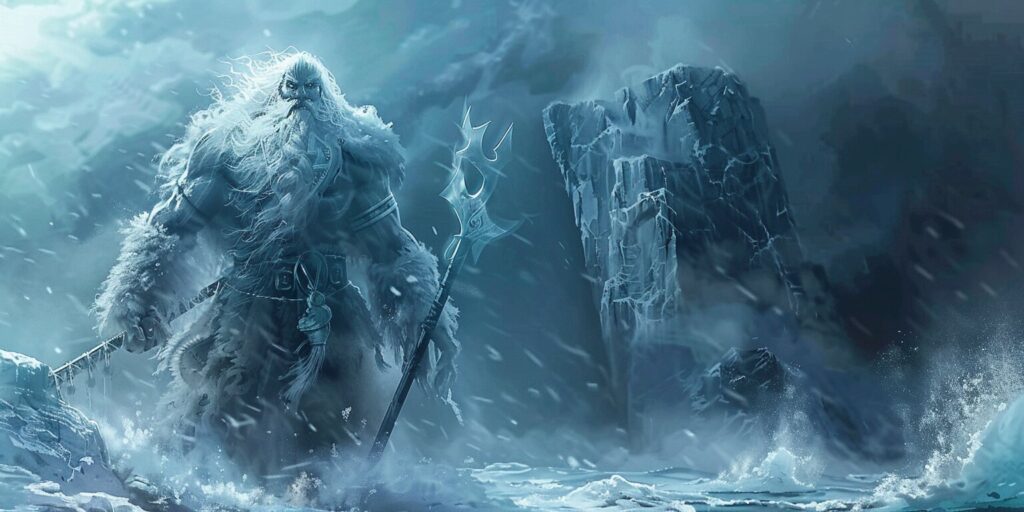
Buri’s position as the progenitor deity places him at the very core of Norse cosmology. According to ancient Norse myths, Buri emerged from the ice in Ginnungagap, the primordial void. As the first god to come into existence, he paved the way for the subsequent divine beings and the vast universe that followed.
With his divine presence, Buri epitomizes the power of creation and the birth of the cosmos. His essence and actions set into motion the intricate tapestry of Norse mythology, where worlds and beings intertwine in a grand epic of gods, giants, monsters, and mortals.
Buri’s Origins
Buri is a fascinating figure in Norse mythology whose origins are shrouded in legend and mystery. According to ancient Norse texts, Buri was born from the primal chaos that existed before the creation of the world. He emerged into existence, self-formed and powerful, from the ice of Ginnungagap, the primordial void.
Legend has it that Buri’s birth was a testament to his divine nature. As he stepped forth from the ice, he brought light and warmth to the frozen world, igniting the spark of life and setting in motion the forces that would shape the realms. His emergence marked the beginning of the creation of the Nine Realms within Norse cosmology.
The tales surrounding Buri’s birth are fraught with symbolism and significance. They speak of the inherent power and potential within the primal forces of nature and exemplify the cyclical nature of creation and rebirth in Norse mythology.
Buri’s origins as the progenitor deity in Norse mythology are central to his role within the pantheon of gods. As the ancestor of the gods, his existence connects the divine beings to the primordial forces of the cosmos, bridging the gap between the divine and the natural world.
As we delve further into the mythos of the Norse god Buri, we unlock the key to understanding his significance and influence over the realms. Join us in the next section as we explore Buri’s powers and abilities, unraveling the depths of his divine nature.
Buri Norse God Powers and Abilities
In Norse mythology, Buri, the progenitor deity, is known for his formidable powers and exceptional abilities. As a revered god, Buri wields authority over various aspects of the natural world, showcasing his divine attributes and commanding presence.
1. Control over the Elements: Buri possesses the power to manipulate the elements, bringing about dramatic changes in the environment. With a mere gesture, he can conjure storms, manipulate fire, and shape the very fabric of the earth, displaying his mastery over nature.
2. Immense Strength: Buri is renowned for his extraordinary strength, surpassing that of any mortal or deity. His extraordinary physical prowess enables him to easily perform incredible feats, such as lifting and moving colossal objects.
3. Divine Wisdom: Buri embodies wisdom and knowledge beyond mortal comprehension. His deep understanding of the cosmos, combined with ancient wisdom, grants him unparalleled insight into the mysteries of the universe and the intricate workings of fate.
4. Longevity and Immortality: Buri enjoys a long-lasting life and eternal existence as an immortal deity. His divine nature grants him immortality, allowing him to endure throughout the ages and witness the changing tides of time.
5. Fertility and Growth: Buri’s powers extend to fertility and growth, encompassing both the natural world and mortal realms. Through his divine influence, he nurtures the earth, ensuring bountiful harvests and thriving ecosystems.
Depictions of Buri in Mythology
According to ancient Norse art and literature, Buri is often depicted as an imposing figure radiating strength and wisdom. He is regal in appearance, often adorned in majestic robes and with symbols of his divine authority.
Buri’s portrayal in Norse mythology showcases his immense power and role as the progenitor deity, shaping and influencing the cosmos and the lives of both gods and mortals alike.
- Buri’s control over the elements captured in intricate sculptures, with swirling winds and flames at his command
- Illustrations of Buri’s strength depict him lifting mountains and creating vast canyons with a single gesture
- Depictions of Buri in deep contemplation symbolize his profound wisdom and connection to the cosmic forces
- Artwork representing Buri surrounded by lush landscapes and thriving harvests, a testament to his fertility and growth-enhancing abilities
Through these depictions, the power and influence of Buri are immortalized, underscoring his significance and the reverence accorded to him in Norse mythology.
Buri’s Symbolism and Depictions
In Norse mythology, the symbolism associated with Buri offers a fascinating glimpse into the significance of this revered deity. Depicted in ancient Norse art and literature, Buri holds a central role in the intricate tapestry of Norse cosmology.
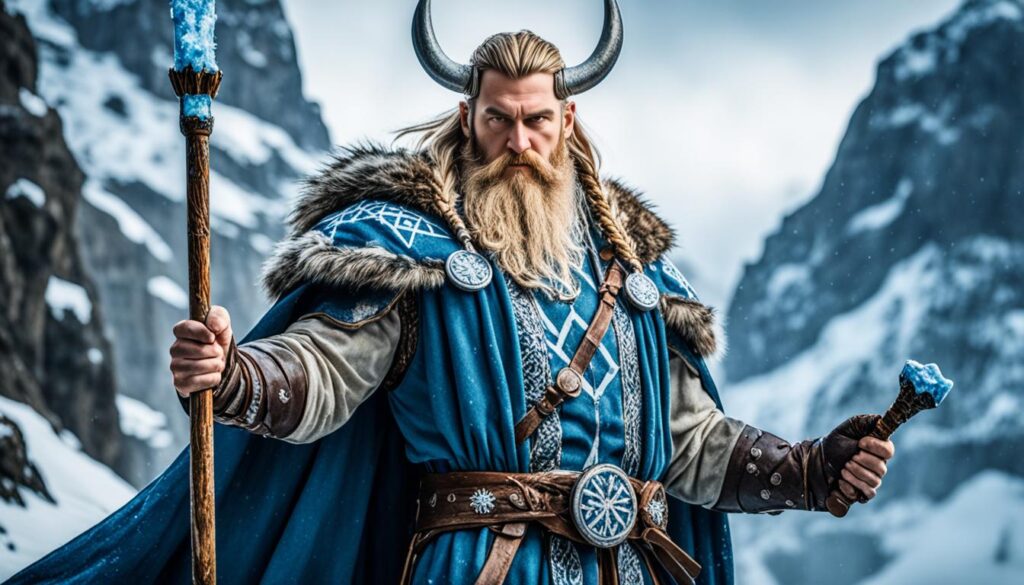
Buri’s representation often showcases his connection to primeval forces and the foundational elements of the natural world. He is frequently depicted as a powerful figure imbued with wisdom and the creative energy that sparked the birth of the gods.
One common motif in the depiction of Buri is his association with the earth and fertility. In sculptures and paintings, he is often shown standing on the ground, symbolizing his role as a progenitor deity who brings life and abundance to the realms.
Furthermore, Buri’s symbolism often extends to his portrayal as a wise and revered ancestor. In ancient texts, he is highlighted as the progenitor of the divine lineage, connecting him to the gods that would follow in his footsteps, such as Odin and Thor.
His embodiment of wisdom is often depicted through his regal appearance, with flowing facial hair and a contemplative expression. This reflects the importance of Buri as a figure of knowledge and guidance in Norse mythology.
In addition to his physical depictions, Buri’s symbolism is also conveyed through various mythical narratives. His stories often emphasize the cyclical nature of existence, representing the eternal cycle of creation and destruction.
Through his symbolic representations and the myths surrounding his character, Buri offers a window into the rich and complex world of Norse mythology, shedding light on the profound beliefs and values of the ancient Norse people.
Buri’s Influence on Other Gods
In Norse mythology, the god Buri played a significant role in shaping the destiny of his fellow deities. As the progenitor deity and ancestor of the gods, Buri held a unique position of influence and authority. His connections and interactions with prominent figures like Odin and Thor further reinforced his impact on the pantheon.
One of Buri’s most notable relationships was with Odin, the Allfather and ruler of Asgard. According to myth, Buri bestowed upon Odin the knowledge and wisdom that would later make him the chief god of the Norse pantheon. This transfer of divine understanding marked the beginning of Odin’s ascendance to power.
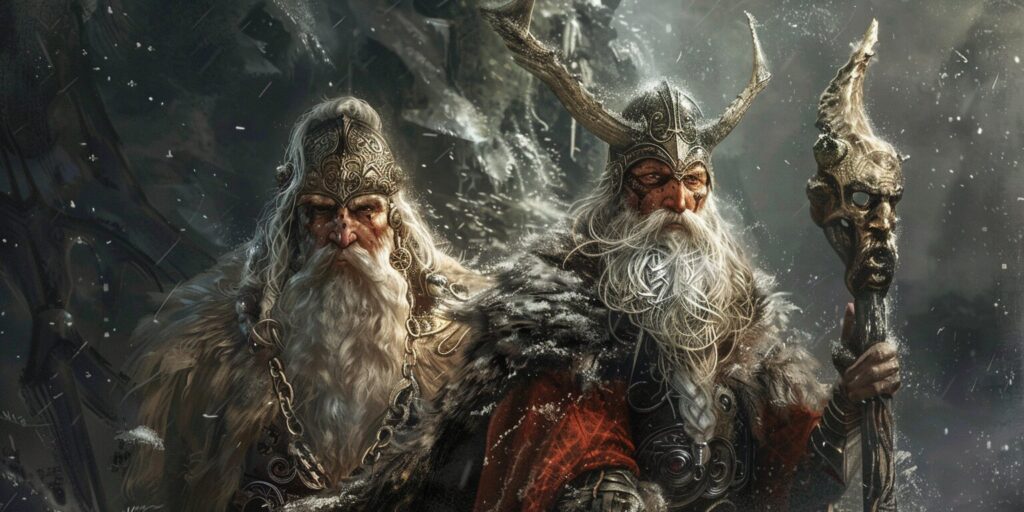
Additionally, Buri’s influence extended to Thor, the god of thunder and strength. Thor was the grandson of Buri and inherited his strength and fierceness from his divine ancestor. Buri’s bloodline to Thor solidified their bond and highlighted the intergenerational impact of the god’s power.
These connections between Buri, Odin, and Thor reveal the intricate web of influence that existed within the Norse pantheon. Buri’s presence as a guiding force in the lives of these gods demonstrates his esteemed status and the respect he commanded among his divine counterparts.
Buri’s Role in Creation
In Norse mythology, Buri plays a significant role in the creation of the world. According to ancient myths and legends, Buri emerges from the primordial void, Ginnungagap, bringing light and life to the cosmos.
As the progenitor deity, Buri sets in motion the chain of events that led to the formation of the Nine Realms. His actions pave the way for the birth of other gods and the establishment of the divine order.
One prominent myth surrounding Buri’s role in creation involves his grandson, Odin. Buri’s grandson Odin, the Allfather, inherits his divine lineage and possesses great wisdom and power. Odin and his brothers Vili and Ve later play crucial roles in shaping the world as we know it.
Through his presence and influence, Buri shapes the cosmos’ destiny and establishes the foundation of the Norse pantheon. His contribution to the creation of the world solidifies his position as one of the pivotal figures in Norse mythology.
To fully comprehend the significance of Buri’s role in creation, we must explore the intricate myths and legends that depict his involvement in shaping the cosmos. These ancient narratives provide valuable insights into the origins and evolution of the Norse universe.
The Myth of Buri’s Emergence
- In Norse mythology, Buri is said to have emerged from the primal void of Ginnungagap.
- He is described as a powerful and radiant deity, bringing light and vitality to the darkness.
- Buri’s emergence marks the beginning of the creation process and the birth of the gods.
To visualize Buri’s pivotal role in the creation of the world, consider the following illustration:
As the mythological narrative unfolds, Buri’s presence becomes the catalyst for developing the Nine Realms and establishing the Norse pantheon. His role in creation reverberates throughout the stories and legends of Norse mythology, shaping the destiny of gods and mortals alike.
Buri’s Legacy
In Norse mythology, Buri’s legacy reverberates throughout the realms, leaving an indelible mark on the gods and mortals who inhabit them. Buri continues shaping the Norse pantheon’s tapestry through his actions and existence.
Buri’s role as the progenitor deity sets the foundation for the divine lineage that follows. As the forefather of gods, his bloodline courses through the veins of powerful entities such as Odin, Thor, and Freyr. The influence of Buri’s bloodline is seen in the strength and wisdom these formidable gods exhibit.
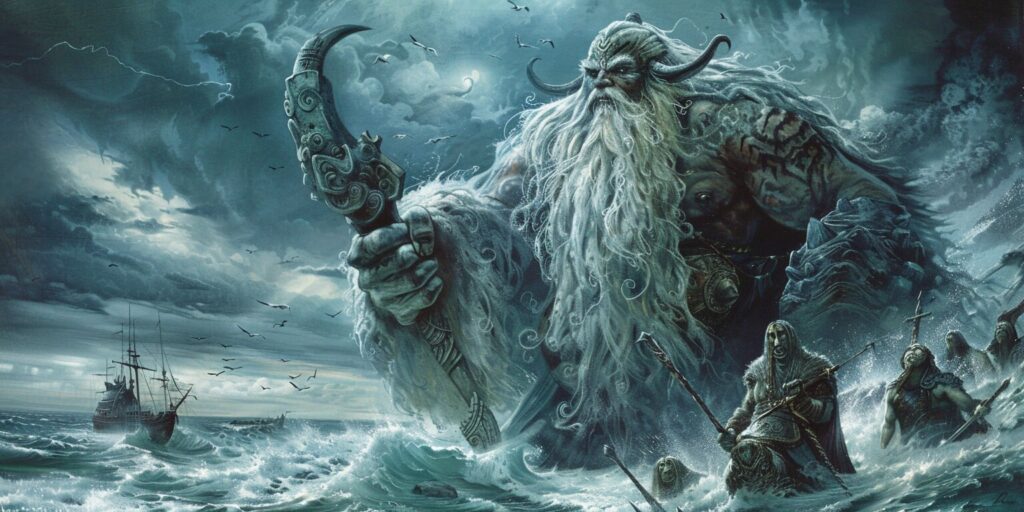
Furthermore, Buri’s legacy extends beyond his direct descendants. His existence serves as a constant reminder of the divine origins of the Norse gods and their connection to the natural world. Buri’s presence fuels the reverence and awe bestowed upon the gods by mortal worshippers, reinforcing the belief in their immortality and supernatural abilities.
In addition to his impact on the gods, Buri’s legacy also shapes the destiny of mortals. His divine lineage intertwines with the mortal realm, guiding the destinies of brave heroes and valiant warriors. Mortals who possess the blood of Buri’s descendants are often fated for greatness, their deeds echoing the heroism and valor of the gods.
The image below captures the essence of Buri’s legacy, depicting the divine power and ancestral connection that radiates through the realms.
Buri’s legacy transcends time and continues to inspire awe and wonder in the hearts of those who seek to understand the ancient tales of Norse mythology. Through his actions and existence, Buri’s impact on the gods and mortals ensures that his name and legacy shall forever be engraved in the annals of Norse mythology.
Buri in Modern Culture
In Norse mythology, Buri, the progenitor deity, continues to captivate modern audiences through his presence in various forms of contemporary media. His portrayal in books, movies, and television shows has helped fuel the enduring fascination with Norse mythology.
One notable example of Buri’s depiction in modern culture can be found in the popular Marvel Cinematic Universe (MCU). In this cinematic universe, based on Marvel Comics, Buri’s character is adapted into Odin, Thor’s powerful Allfather and father. Odin’s role as the ruler of Asgard and his connection to the Nine Realms echoes the mythological significance of Buri as the forefather of the gods and creator of the cosmos.
Buri’s influence can also be seen in contemporary fantasy literature. Authors often draw inspiration from Norse mythology, incorporating elements of Buri’s character and stories into their own fictional worlds. This allows readers to explore and experience the rich tapestry of Norse mythology, with Buri’s legacy woven into the narrative fabric.
Additionally, the enduring popularity of Norse mythology has led to the emergence of online communities, forums, and social media platforms dedicated to discussing and celebrating the gods of the Norse pantheon, including Buri. These platforms provide a space for enthusiasts to share their knowledge, exchange ideas, and delve deeper into the realm of Norse mythology.
From the silver screen to the pages of books, Buri’s presence in modern culture serves as a testament to the lasting impact of Norse mythology. As audiences continue to be captivated by the gods and tales of ancient Scandinavia, Buri’s role as the progenitor deity remains a powerful symbol of creation and divine heritage.
Norse God Buri: A Source of Inspiration
Buri’s mythological significance goes beyond entertainment value. His character serves as a source of inspiration for individuals seeking wisdom, strength, and resilience. The stories of Buri remind us of the transformative power of knowledge and the importance of embracing our ancestral roots.
This Norse god’s enduring presence in popular culture reminds us of the richness and depth of Norse mythology. By exploring and celebrating the tales of Buri, we gain a deeper understanding of ancient cultures and the enduring human fascination with divine beings.
As we move forward, Buri’s legacy continues to shape the future of storytelling, art, and literature. Through his timeless tales, we find inspiration, enlightenment, and a connection to a mythical past that continues to shape our present and inspire the generations to come.
Final Words
In conclusion, Buri occupies a significant role as the progenitor deity in Norse mythology. As the ancestor of the gods, Buri is immensely important in creating and shaping the Nine Realms. His mythical journey and divine attributes showcase his power and influence over the natural world.
Throughout Norse mythology, Buri’s character symbolizes the enduring cycles of creation and legacy. His connections with other gods like Odin and Thor highlight his impact on the Norse pantheon and the interwoven nature of their stories. The tales of Buri continue to captivate audiences, inspiring fascination and awe for the rich mythology of the Norse gods.
Even in modern culture, Buri’s presence can be felt. His portrayal in contemporary media and the ongoing interest in Norse mythology attests to his character’s lasting significance. As we reflect on Buri’s mythical journey, it becomes evident that his legacy will continue to shape the narratives and imaginations of those who seek to explore the intricate tapestry of Norse mythology.

